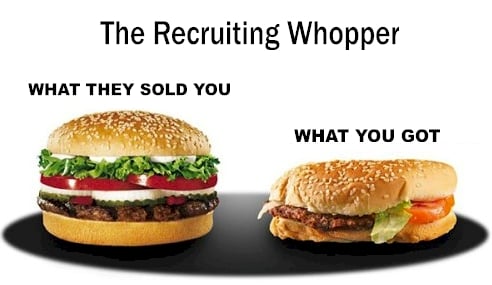In the January 10, 2017 Ask The Headhunter Newsletter, we attempt a reality check — about jobs. Disclosure: I wrote a snarky column to start the New Year. But it’s not as snarky as the news.
Question
Nick, I know the newsletter has been on vacation over the holidays, but have you been reading the jobs news? Am I crazy, or do people really believe unemployment is down and pay is up? That there’s suddenly a job for anyone who wants it? That all our troubles are over? Man, sign me up for a new job for 2X what I was making when I had a job!
Nick’s Reply
 During my Christmas break, the news kept coming hot and heavy from the U.S. Department of Labor and associated pundits and experts: You should stop complaining about jobs and salaries. Everything’s great!
During my Christmas break, the news kept coming hot and heavy from the U.S. Department of Labor and associated pundits and experts: You should stop complaining about jobs and salaries. Everything’s great!
I’m sure you’re reading the same good news, but all I want to know is, does this reflect your experience with the job market and employers? Or is your head spinning?
Jobs: U.S. Department of Labor News
In the past few days, the DOL reported:
- “Unemployment rates were significantly lower in November in 18 states and stable in 32 states and the District of Columbia…”
- “The national unemployment rate was 4.6 percent in November, down from 4.9 percent in October, and 0.4 percentage point lower than in November 2015.”
Fewer people unemployed!
Bloomberg News
Recent Bloomberg reports tell us:
- “The 4.7 percent jobless rate remains close to a nine-year low, even with a tick up last month.”
- We’re seeing “enduring wage gains as labor market tightens.”
You’re getting paid more and employers are working harder to hire you!
- “Worker pay rises at fastest pace since end of last recession.”
- “Fiscal stimulus would stoke further gains as labor [is] scarce.”
- “Average hourly earnings jumped by 2.9 percent in the 12 months through December, the most since the last recession ended in June 2009.”
- “Workers in almost every category, from mining and construction to retail and education, saw paychecks rise from November.”
JPMorgan Economic News
Michael Feroli, JPMorgan’s chief economist, says:
- “I expect to see continued acceleration in wages this year.”
And get this: Labor shortages may become more common. Employers are going to be begging you to take a job! I hope that makes you feel better if you’re facing a shortage of exactly the one job you need to pay your bills.
But then there are the gotchas from from the DOL reported by Bloomberg:
- “More Americans joined the labor force but had not yet found jobs.”
Oops. And try this double-talk on for size:
- “The number of people who were jobless and gave up looking for work declined to a three-month low…” but “One caveat: fewer people who were already in the labor force but unemployed were able to find jobs.”
Associated Press News
The Associated Press isn’t being left behind:
- Since 2009, “the job market is in infinitely better shape. The unemployment rate is 4.7 percent. Jobs have been added for 75 straight months, the longest such streak on record.”
- But, er, ah… “The proportion of Americans with jobs… dropped a full percentage point.”
Uh… apply the grammatical logic tool to that one and you get… More Americans are without jobs!
- “Hiring has been solid yet still hasn’t kept up with population growth.”
- “…many workers, especially less-educated men, have become discouraged about finding jobs with decent pay and have stopped looking.”
Yes, that means many, many Americans are screwed, but they’re probably not educated enough to parse those sentences to glean the economic reality. But when they try to pay for food next week, they’ll grab their pitchforks and torches.
Middle America
And don’t miss this troubling factoid: The “routine work” that pays middle-income wages is disappearing. But the good news is, those of you doing “higher- and lower-paying jobs” should have no trouble finding work! Tech jobs have “soared” 42%. Hotel and food service jobs have “jumped” 19%!
Apply the grammatical logic tool to that one and you get… Middle America can’t find a job!
- More good news: “Over the past year, average hourly pay has risen 2.9 percent, the healthiest increase in seven years.”
- But, uh, in a “robust economy” pay gains would be more like 3.5%.
There’s more, but your under-paid, under-fed or unemployed (or under-employed) brain probably couldn’t take it.
Let’s stop pretending
The jobs news is so contradictory that nobody knows — or will admit — what’s really going on. While the government, economists, banks and pundits spin a story that makes heads spin, I think the wisdom about all this is in the crowd. The people living, succeeding, failing, giving up, dropping out, scraping by and dying in this economy have a clearer picture of what’s really going on than what’s being reported.
How are you doing?
Early January of a New Year is a good time to sweep away the news and ask you — How are you doing in all this? I think we all want to know what’s really going on in our economy and job market.
- Does this news reflect your experience?
- Are you finding more jobs — real jobs — are begging to be filled?
- Are you getting paid more money?
- Are employers hiring you more quickly at higher salaries?
- If you already have a job, has your boss increased your salary to avoid losing you?
- What’s really going on with respect to jobs, employment and pay?
I don’t think we’ll sort this out, but we can do a more honest job of discussing the truth than the news pretends at!
: :





